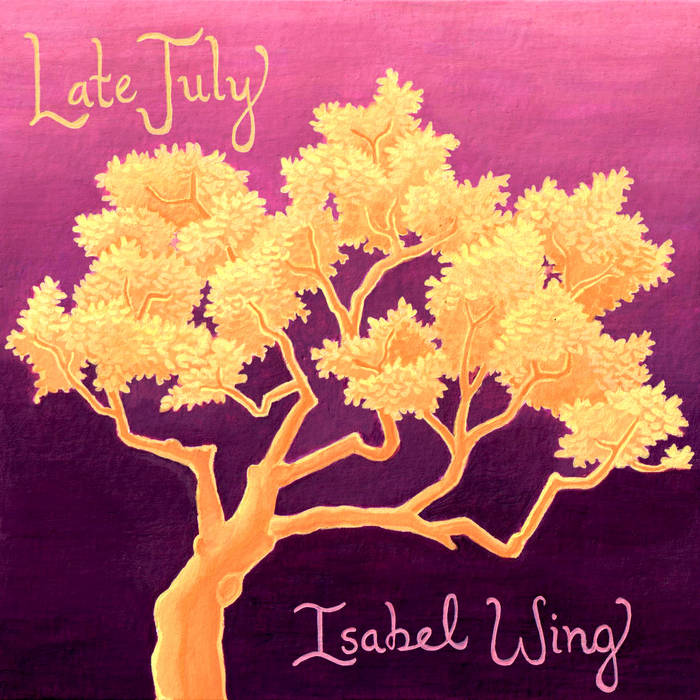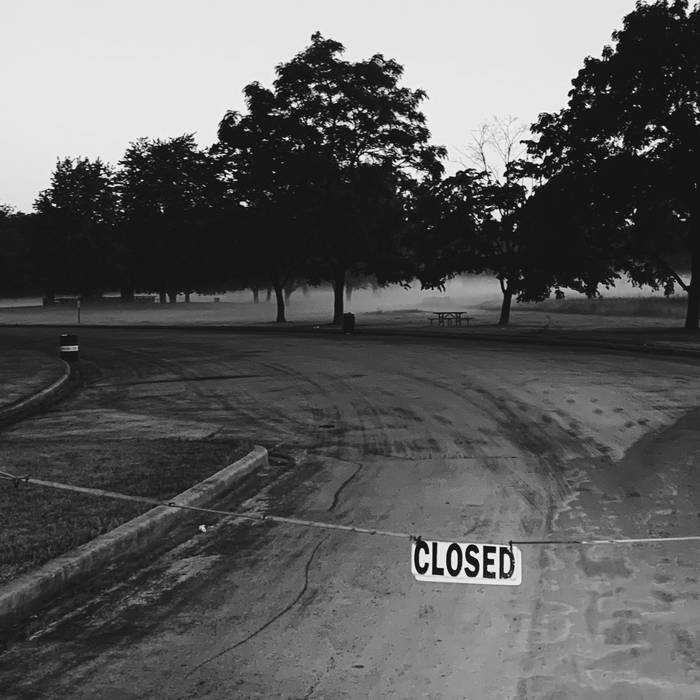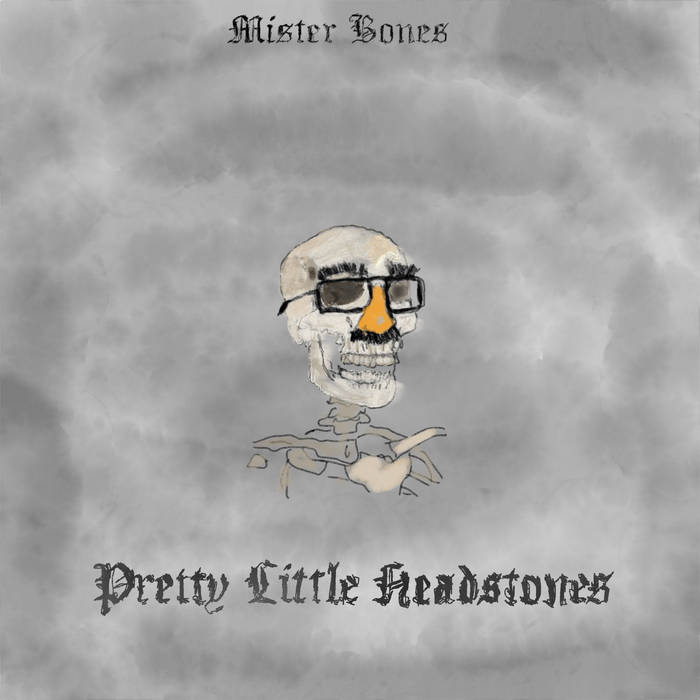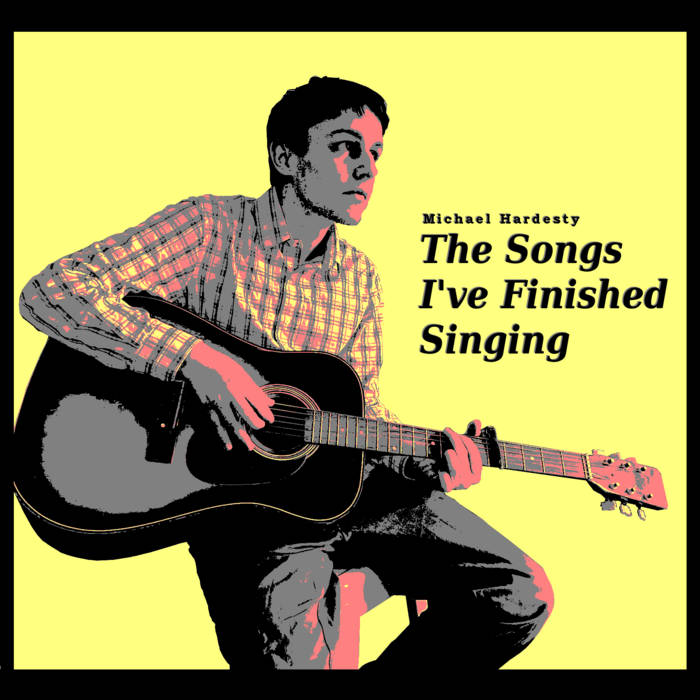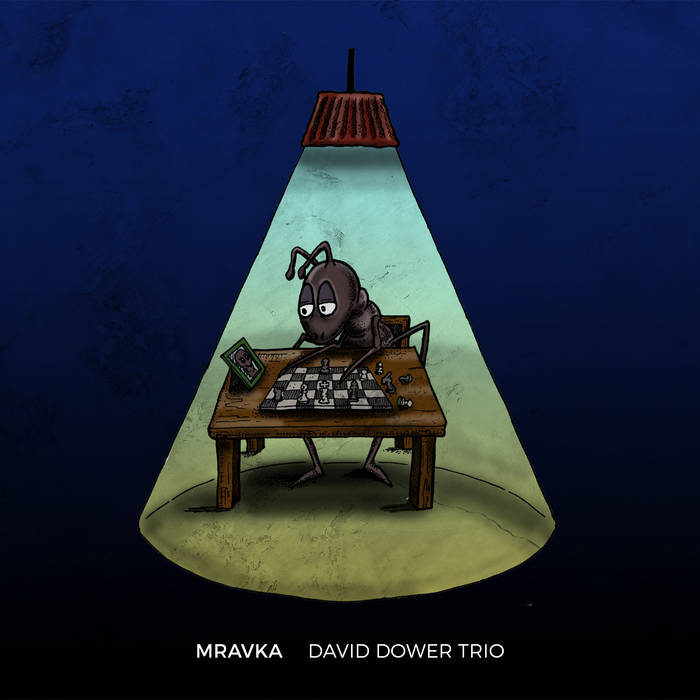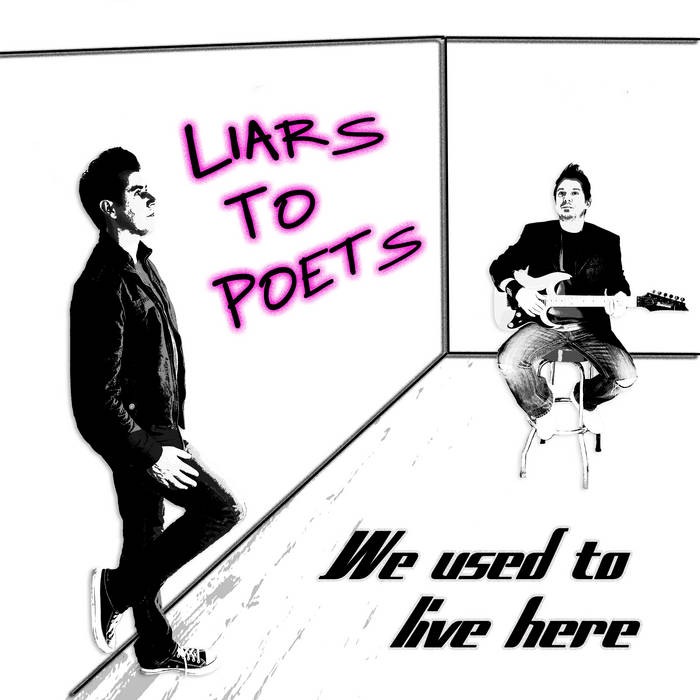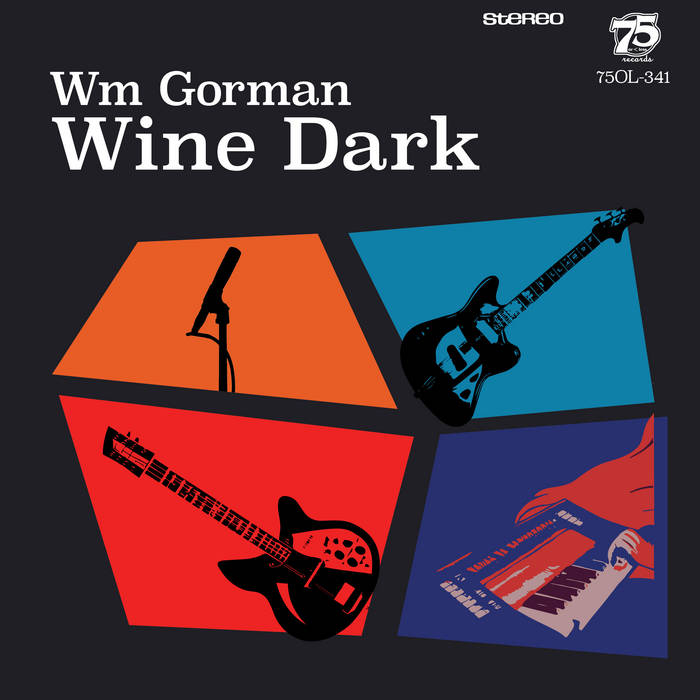|
Isabel Wing describes herself as an independent folk singer from Los Angeles, CA. Her Late July EP, is a small collection of songs that she’s recorded before. According to Wing, “she uses simple melodies and instrumentation to allow the power of her lyrics to shine through.”
Wing contributes the vocal, acoustic guitar and piano parts to Late July, whereas the bass, electric guitar, and lap steel parts come from Arend Jessurun. Reading “lap steel,” I was thinking there’d be some country influence in this project along with the usual folk instrumentation. I was right. The EP “was recorded in Los Angeles, at the studio of Arend Lee Jessurun. It was mixed by Arend Lee Jessurun and mastered by Joseph Freeman.” I first got to hear Wing’s melodic voice on the opening song, “Turning Blue.” With just a tiny bit of huskiness to her timbre, her vocals never feel too labored on top of plinking piano notes. As with the rest of Late July, it is a spare, simplistic composition heavily influenced by artists such as Janis Ian, Laura Marling and Paul Simon. Plus, there are themes of both religion and nature in the song, providing a lovely synthesis between the two. “Giving Up The Game” continues the spareness of “Turning Blue.” With a bit more melancholy feel this time around, Isabel Wing appears to be singing about a difficult situation in her life. Again, the organically produced piano and acoustic guitar are a rich complement to her expressive singing. On the second half of the EP, we get a pair of songs related to relationships, those being the title track “Late July” and “Dolores Park.” First up is “Late July.” It features a typical sort of singer/songwriter-esque chorus that doubles as a list of “How do I love thee? Let me count the ways.” type sayings. Musically, it sounds almost the same as the previous cut, but with a very different message. “Dolores Park,” sees Wing sing in a lower register, this time about a lost love rather than actually being in love. I like how low-key and tranquil this piece is compared to the other three. It may not be quite as mountainous as “Turning Blue” or “Giving Up The Game,” but it’s a sweet finale to a neatly produced collection of four folk songs. Wing’s elegant vocals and nature driven narratives really stand out in this EP. I’m sure that fans of folk and singer/songwriter will dig this latest offering from Southern California native, Isabel Wing. Recommended.
0 Comments
Roxanne Hart is a brand-new artist from Chicago, IL. Having played in heavy punk bands all her life, Hart wanted to make the sort of music that was a departure from the fast and angry sort of music she had been producing all her life.
With Peace of Mind, her debut EP, like the title indicates, this was a move to help “clear her head and give her some comfort.” The music itself had a very lo-fi vibe and in her notes, Hart says that the album was recorded, mixed and mastered on a Tascam DP-006. The sound that comes through is very reverb-drenched, with direct odes to groove, funk and the blues. Altogether the music was very ambient and felt like a balm to the ears. Peace of Mind opens up with “Tell,” where drumming beats come sizzling in at first. Next, some distorted vocals come in for an edgy vibe. The bass lines felt groovy and gave off a funky backbeat. Next a wall of guitars comes in, bringing more of Hart’s gritty sound. I loved the bluesy riff coming off this recording. It definitely made for a great sound. Hart does a complete 180 on “Water (Interlude).” She brings out her acoustic guitar and belts out in a soft voice on this very welcoming ballad. I felt myself relaxing instantly to the soft tunes. Lastly, some powerful strumming from the acoustic guitar comes through on “Useful.” Hart sings with emotional power here. There are some beautiful and moving lyrics. Hart sings "can’t do any favors that redeem me burn my smile with gasoline he trusts me she trusts me too but i still lock myself in his bathroom." I thought this was a moving way to end the EP. The laid-back grooves and Hart’s rather subdued vocals made for a great listening experience. There was something very singer/songwriter about this whole record and I could definitely see this being played in the background of a coffee shop somewhere or at an open mic night. The whole album had a great atmosphere. My only critique was that this record was way too short. With only three tracks, I wished that there were more. Perhaps Hart can expand on her sound in a full-length record soon, which I’ll be looking forward to.
Pretty Little Headstones is the debut album by Mister Bones. It’s a DIY album where the artist did everything from the songwriting to the recording. The artist describes it as “This graveyard is full of sweet, somber and sometimes spooky tunes that would make a skeleton cry.” There are a number of different styles throughout this release but the somber and dark qualities are consistent.
The album begins with “When Southward That Crow Does Fly” which is a clear highlight. It opens with soft and gentle guitar work and elements like bass and drums are added. This song is a melancholy folk/country song and was reminiscent of Bonnie "Prince" Billy and other like-minded artists. The vocals are very well delivered in this song. It’s an emotionally resonant song and a great way to start the album. The country and folk flavor is completely gone on the next song “Living Dead.” This is a slow burn of a song and I would say it goes past the feeling of melancholy. There’s a dismal sort of energy here with very little hope in sight. “Shadow of the Night” is very lo-fi quality but in this case it fits the song really well. It works because the song is minimal with just guitar and vocals. This song has a ’70s folk feel but perhaps a little more dark than your typical song. “Autumn Wind” is just as minimal but the feel is very different. The song is haunting but the hall reverb puts it over the top. It sounds a bit like a stripped back song from Roy Orbison. “Somewhere Inside” contains an electronic beat and fuzzy electric piano while “Mr. Willy Woney” submerges in a dark soundscape that feels a bit Halloween inspired. Piano is the main instrument on “Dancing Without a Floor” which works with the dark vibe but just a different angle from the guitar. The artist continues to experiment with different styles of music. “Eternally Dreaming (You'll Bring a Rose)” seems to have a completely different singer who sounds like Willie Nelson. There were a number of high points as the album progressed such as “Everytime Around New Year” and “I Know.” My only critique was that the album felt a little scattered in terms of style and genre. I would have liked to hear a little more cohesion in this area. Overall, I thought this was a really good debut. It’s a dark ride but I found it emotive and earnest. Take a listen.
Michael Hardesty is a musician from Morrison, Illinois who recently released The Songs I've Finished Singing. The album contains ten songs and for the most part revolves around acoustic guitar and vocals. It’s very much aligned with ’70s bohemian folk that was coming out of venues in New York.
The songs are sometimes political and often pinpoint specific issues with Illinois. I happen to live in Chicago so I was able to pick up on some of his references. The songs are almost all strummed and Hardesty implements most major and minor chords. “These Illinois Blues” starts off the album and I thought this was one of the highlights. It’s catchy, well delivered and I thought the lyrics were well written. Hardesty sings “Illinois Blues / In the schools, in the streets / In the cradle or on their feet / you’ll pay your dues.” There’s more of a somber and serious tone with “Desdemona.” The emotion works and subtle shades of brilliance shine here with memorable vocal melodies. Hardesty doesn't seem to like Lori Lightfoot on “An Ode To Lori Lightfoot.” In fact Hardesty paints a pretty evil character. The song sounds like a standard protest or political tune from the late ’60s and ’70s. “I Don't Want To Talk Anymore” is more poetic and revolves around dreams, interpretation and perception while “Let The Fascists Hang For All Time” gets back into political territory. I was happy to hear some guitar picking on “Rock River” which is somber but one of the most powerful songs on the album. “The Castle In The Wood” was solid and we get some harmonica on “The Son's Song.” “Westward Train Odyssey” gets back into ’70s folk territory. Hardesty leaves one of the highlights for last entitled “The End Of History.” The picking is great and also contains some of the best delivered vocals. As an engineer myself I wanted a little more body in the recording of the guitar. There are also a couple of songs which feel like the vocals are too loud and on top of the mix. Despite these minor issues I thought the songs were well written and delivered. This is a simplistic and minimalistic album but not without heart and emotion. Take a listen.
David Dower Trio is based in Melbourne, Australia, but given a cursory listen you’d swear they were a Bulgarian music collective. That’s because atop their Ben Folds-style arrangements they often use Bulgarian vocalists and lyricists and actually recorded in Sofia, Bulgaria. Their albums are a fascinating cultural mashup way beyond Paul Simon or David Byrne, of which Mravka is their third.
The core group features David Dower (piano), Luke Fowler (bass) and Matt Fisher (drums). They describe their music as a “true amalgamation of genres” including pop, jazz and rock, with influences from the Ben Folds Five, The Bad Plus, Brad Mehldau, Squarepusher and traditional Bulgarian choral music. Their tracks feature “distorted-fuzz-bass, drum-and-bass break-downs and powerful ballads. There are multi-meter Bulgarian choir songs that both flow and have a strong back-beat.” Along with band tours in the UK and Bulgaria, the trio have performed at the Bansko International Jazz Festival, the Burgas Jazz Festival among many others. They’ve also had airtime on BBC3 radio, ABC Radio, Bulgarian Jazz FM, PBS Melbourne and Soundbytes in the United States. Like reviewers before me, I was surprised when the first song “Selo” did not start with a classic power trio sound, but instead featured the eerie yet beautiful vocals by the Bulgarian Choir (Rayna Vasileva, Pirina Hristova and Gabriela Milanova) singing lyrics by Mariana Vasileva. When the trio kicks in, they have a tight jazz sound with acoustic piano that recalls Keith Emerson. The vocals are not just introductory, however, in that they continue to follow and provide counterpoint to the jazzy melodies. I don’t have an extensive jazz background but have always enjoyed keyboard-based prog rock (E.L.P., Yes, etc.) so this music feels somewhat familiar, while the addition of the Bulgarian singers takes it nowhere I’ve remotely been before. It’s a new and quite beautiful combination of sounds and melodies. This six-minute track has four distinct sections, culminating in a glorious full-circle conclusion that even uses some fuzz guitar or bass. The next track “Kopanitsa” is a straight instrumental that (like the band’s previous release) showcases Zhivko Vasilev on the Bulgarian Kaval, a flute-style instrument. Musically it sounds like a flute made of wood, which is pretty much what it is. It’d be cliche to compare this track to the more prog leanings of Jethro Tull, but for the layman that might be a good touchstone. Dower’s compositional prowess is on full display, as the composition features compelling, ever changing melodies against playful yet accessible time signatures. The title track “Mravka” pares the music down to just the trio, with the piano and bass performing Dower’s complex melodies in perfect sync. Fowler is able to get a sound from his bass somewhere between Jaco Pastorius and an acoustic standup bass. Dower is no slouch either, as his piano playing is energetic, playful and joyous. And so he’s not left out, Matt Fishers’ drums are spot on, constantly inventive and breathtakingly precise. I love the vocal tracks but this is a clear instrumental highlight. “Tell Me What You See” is quite different again, with a classical piano intro and a lovely, torch-like lead vocal by Vesela Morova. The core trio is also augmented beautifully by Tristan Reblen’s horns and Elliot Frost’s guitar. This track has the sophistication of one of the better show tunes by Andrew Lloyd Webber, along with a solo piano middle section. “Syanka” brings back the Bulgarian choir from the first track with the Kaval from the second. This time the singers hit some high notes that in a different context could have come from a Kate Bush LP. At other points the choruses feel like chants. The music is both sweet and dark, with a lot of dramatic interplay between the piano and woodwind. “I Don’t Like Mondays” is an instrumental cover of the classic Boomtown Rats track, which was an eerie callout to convicted sniper Brenda Spencer. Without vocals, Dower really gets to dig into the melodic nuances, though as with the original it can’t help but feel creepy and disturbing. The closing track “Freya” is finally just the trio once more, and it very much feels like music for dousing the candles and nestling with a hot water bottle beneath the sheets. Dower’s piano takes most of the stage with tasteful backup from Fowler and Fisher, making this a piano showcase until the last minute or so. A gentle and fitting capper. If you like jazz, prog and world music, you can’t do better than this compelling collection!
School friends Steven Bosley and Dave Brown reconnected with each other to form 4Q. a few years ago after losing touch. The creative process almost started by accident but the major obstacle was that they lived almost 6,000 miles apart - in Bangkok, Thailand and Stoke-on-Trent, England respectively. The songs were constructed using basic software, hundreds of emails and lots of patience. After more than two years the result is Hand Eye. It’s a rock based album that contains twelve songs.
The first song is entitled “I Know, You Know” and revolves around fuzzy power chords, drums and almost an indistinct sounding bass. It’s a straightforward tune with a verse/chorus/verse type of structure. The vocalist sings “Our love will see it through I know you know / My love will take you to I know you know.” “How Was I To Know?” is a sort of ballad and has some nice moments and reminded me of The Beatles. That being said, the song is very lo-fi. “Demons” sounds like it might be a different singer doing the lead. I was getting ’80s and '90s flavor with this song. “Being Together” was a solid song and features a female singer. It revolves around jangly guitar chords and a discombobulated drum beat. The song sounded out of time but perhaps that was the intent. “Life Is A Terrible Thing” might sound negative but it’s one of the arguable highlights in the batch with a driving rock n’ roll flavor. Somewhat ironically the next song is “You Only Live Once.” The timing with this song is all over the place. My brain was constantly trying to catch up with what was happening. “You're Not The One” has a folk inspired rock flavor while “Crime Of The Heart” is a grunge inspired ’90s tune. “Son Of A Gun (S.O.A.G.)” is one of the highlights and also the closer. The groove on this song is locked and the mixing is also some of the best you will hear on this release. As a producer and engineer myself there were a couple technical issues. There often wasn’t as much separation as I wanted with the instrumentation and on some of the songs the vocals were on top of the mix. Throughout the album the drums were often too busy and didn’t always sound locked in. That being said the band's strength is the songwriting. I appreciated the lyrics and felt the songs often came from the heart. It’s not easy to collaborate remotely but I would say they pulled off a solid release. Take a listen.
Rick Reichert is a brand-new artist from Central New York. During his early years, the artist traveled the world with his family as the son of U.S. Air Force serving parents. He eventually decided to serve in the military himself and after returning to Central New York after serving, his wife brought him his first guitar. Reichert threw himself into learning how to play. Now six guitars and some additional years later, he has had the pleasure to be teaming up with Grammy-nominated Bob F. Acquaviva who produced his first full-length album release, Along A Path. Reichert mixes his love for medieval/mythical themes with daily life elements on this hugely classic rock album. Wailing guitar solos and bombastic vocals that had a way of reminding me of Axel Rose, grab hold of listeners and just won’t let go.
Along A Path gets started with “Sword and Stone,” where listeners are blitzed with a radioactive sound coming from the guitars. Once Reichert’s vocals come in, you will be captivated by its gritty delivery. The wall-to-wall guitars really make the sound, which sounded spectacular. I was loving the energy of this piece, which pointed to classic rock in the best sense possible. More great energy comes across on “Not Gonna Matter.” As driven guitars grab hold of you, Reichert’s enthused vocals lights up the sounds. Synths and heavy guitars immediately arrest the sounds on “Renaissance Man.” The drums are insanely fast-paced, but Reichert keeps up the momentum with his revved singing abilities. He really belts out the lyrics with feeling which added to the hard-hitting sounds. Drums and the appealing sound of sax arrives for a searing sound on “I Got You.” Though Reichert tones it down a notch here, there was still that same raw energy I saw in the previous songs. The radioactive guitar solo really sounded great. “The Long Road” is a departure from Reichert’s originally hard-hitting sound. On this slow burning track, the artist takes his time in letting the melody evolve. Here Reichert sings with emotional power. On this moving ballad, we get to see a different side to the artist. On the pop-driven “Still Standing,” we get some piano riffs and giant guitars. The moving rhythms and contagious backbeat made for an excellent listen. I think Reichert really conjures Meat Loaf here. On “Truth,” more hard-hitting rhythms and guitars come through this recording. Once more, Reichert’s gritty vocals make the sound. This was another energetic rock anthem that I greatly enjoyed. The sounds of shooting fireworks also make this track that much more epic. On “Saying Goodbye (Brek’s Song),” atmospheric synths enter. Soon, some acoustic guitar and piano arrive for a moving sound. On this ballad, Reichert sings with emotional power. Then, the song opens up for a fuller band vibe where Reichert really belts out here for a searing performance. A wall of guitars comes bursting forth from “Valhalla Calls.” The sounds surround you for a driven and hard-hitting vibe. This simmering rock anthem felt like a great way to close the record. Reichert lists his influences for the album as Pink Floyd, Thin Lizzy, Def Leppard, Foo Fighters, Queen and Boston. You can definitely hear these influences in Reichert’s sound as he takes you on a ride through ‘70s rock through the ages till now. Bursting at the seams with high-tail energy, you can’t help but be carried away by the driven sounds. If you’re a fan of classic rock n’ roll, then this might be just for you. Be sure you give this a spin today!
Cabbaggage is the solo project of singer/songwriter and multi-instrumentalist Levi Kempster. Kempster is based in Vancouver, Canada and recently released Piano Homage To Gormenghast. The artist explains that his influences are extremely wide-ranging and vary from day-to-day, but some of his most consistent influences are Bob Dylan, Nick Drake, John Fahey, The Beatles, Sibylle Baier, Vashti Bunyan, Van Morrison, Mutual Benefit, Julie Byrne, The Spookfish, Lisa/Liza and Miles Hewitt.
This is an instrumental release but it’s also apparently a concept album. Kempster mentions “It's an experimental/neoclassical solo piano album. Each song is a character piece, with track titles as the names of characters from the 1946 fantasy novel Titus Groan by Mervyn Peake. It is not necessary to have read or be familiar with Titus Groan or the Gormenghast series in order to enjoy these piano pieces, but reading those books will hopefully add an additional layer of depth and meaning that would otherwise be absent.” The album begins with “Lord Sepulchrave, The 76th Earl Of Groan” which sounds like it was played on electric piano. I found the music to create a serene and calming type of feeling. There’s a sense of stillness to it with a side of melancholy. It did remind me somewhat of work you might hear from the notable composer Max Richter. Up next is “Gertrude, The 76th Countess Of Groan” where the energy picks up. It’s also quite dissonant. There’s the not so subtle sound of birds. So many birds in fact it sounds like you’re in the middle of a tropical rainforest. The main piano chords repeat until there’s a lull where there’s more space in the song. Towards the end the constant sound of birds does fade out. I started to feel like I was going down a cosmic wormhole on “Lord Titus, Heir Of The Gormenghast Earldom.” This an atmospheric song with pads surrounding the piano melodies. It also contains a cerebral and pensive quality. “Lady Fuchsia I” felt like an extension of “Lord Titus, Heir Of The Gormenghast Earldom.” The palate of sounds is very similar. It continues to feel like a unique contrast of tones and textures. On “Nannie Slagg” we seem to get a solo piano piece. It was one of my favorite tracks. The playing style here was similar to one of my favorite pianists called Nils Frahm. “Lady Cora And Lady Clarice” is more experimental and sounds like it has at least one filter running through it. The effect makes the song sound submerged. There’s also a lot of dissonance making it one of the more haunting songs that could be used in a horror movie. There are some more surprises ahead. “Dr. Prunesquallor” is also experimental. There’s a distance to this song and it sounds like you are exploring a maze with surprises around every corner. “Steerpike” felt like it was in similar territory but a little more dynamic. Last up is a very solid piano piece entitled “Lady Fuchsia II” which is mainly piano but experiments with different effects. The tone and reflections of the reverb changes to a degree where it’s very audible. I’ve been a fan of contemporary classical music for a long time. This is an album I think fans of the genre will enjoy especially if you appreciate some of the aforementioned names.
Liars to Poets is a collaboration project between Marc Eswards and Aaron Masters that began in the spring of 2019. The band started to work on material and recently released their debut album entitled We Used To Live Here. To my ears this is a musical hybrid of an album that combines elements of electronic, alternative and experimental music.
“Night on a Wire” is the opener. The song contains a rumbling bass, electric guitar and inventive percussion. I was picking up on a lot of different elements. Some of the guitar work had an arena rock quality. I was impressed with the areas the song went into. There were a lot of surprises and unpredictability I enjoyed. On “Prisoner of the Year” we get some experimentation. The percussion elements were manipulated with effects which I thought was a major part of the song. There are also lush and ambient breakdowns. Similar to the previous song it goes in all sorts of different directions. I found the vocals to be well delivered and stood out against the instruments. “Cold Autumn Drive” is a high energy tune bursting from the seams and in my opinion one of the more single worthy tunes. The band does settle however from the piano led breakdown with intricate guitar work to the explosive last chorus with spliced vocals. “Deadbirds” is one of the emotionally resonant songs This song in particularly had a bit of darker quality. There are blaring lead guitars with a subdued foundation that proved to be a winning combination. By the time I got to “Seconds Before” their signature sound was starting to solidify for me. Some of the aesthetics from the previous songs were appearing in various forms. “Extended Stay (at the pink fountain motel)” is a hard hitting song on the verge of industrial while “Panic!” combines elements of pop-punk with a goth infused electronic quality. The vocal harmonies sound great on this song. “We Used to Live Here” is very cool and almost R&B sounding. The vocals soar here and the drum programming rivals some of their best songs. “A Night Cap?” has this slightly bluesy/rock guitar pattern with airy pads while “Still Waves” is a bit funky, slick and very groove based. They close with “Broken Reel” which is different from anything else. It’s a piano ballad with a great vocal performance and free of drums. The duo did a great job forming a unique and signature sound. Their blend of electronic and rock music felt seamless, This was a really good album I encourage you to listen to. Recommended.
Become A Fan
Wm. Gorman is an artist we first heard of last year with his release Plague Under The Portico. The artist is back with a new release entitled Wine Dark. It’s a full length album with thirteen songs. Throughout the album I felt like there was convergence between rock based music from the ’70s as well as a more contemporary approach.
“Soldier On” opens up the album and definitely has the feel of an opener. The instruments percolate and start to find their way. It’s a warm mix of organic instruments like guitar, keys, drums and bass. The guitar work was melodic and I found the song memorable. Strong start. “The Price” was one of my favorites. I was actually reminded more of bands like Deerhunter and Real Estate. It’s just a killer song with dynamic and smooth transitions. The hook is especially good with solid guitar work and a vocal hook you might be singing along with after the first listen. On “The Open Sea” we have a bit of a ’70s folk quality. The song is a little more melancholy, pensive and existential than the previous tunes. I loved the guitar picking here which is reminiscent of a song like “Blackbird” by The Beatles. The song does change with airy vocal harmonies and this lush groove which feels like you’re on a cloud. “Let Nature Run Its Course” drives with a fuzzy bass and an almost futuristic feel like you’re in some cyberpunk reality. The drums and bass carry this song. At this point on the album I was enjoying the variety of styles. The guitar work was a high point. “Just So” took it to the next level. I loved the production here and the instrumental aspects gel perfectly. That combined with exceptional vocal melodies and you have a highlight. The album continues with “Perfectly Natural” and “Windows Down” which I thought were both solid songs with a mid level type of rock energy. The more melancholy “Mephistopheles” is a warm and comforting song. I was also greeted with a sense of awe in the same way I feel when I listen to Pink Floyd. I was impressed with the quality of the songs as I approached the end of the album. “Streets of Pompeii” and “You Can't Expect Things To Get Better” were some of the high points. The album ends with a song called “7/2” which is an ambient soundscape not too far off from Brian Eno. It did feel a little off brand to close the album with this sort of track but I still enjoyed it. This is a really good album from beginning to end. It solidifies the artist's talent in my opinion. If you appreciate some of the aforementioned artists this should be an easy win. Take a listen. |
Critique/insightWe are dedicated to informing the public about the different types of independent music that is available for your listening pleasure as well as giving the artist a professional critique from a seasoned music geek. We critique a wide variety of niche genres like experimental, IDM, electronic, ambient, shoegaze and much more.
Are you one of our faithful visitors who enjoys our website? Like us on Facebook
Archives
July 2024
|

